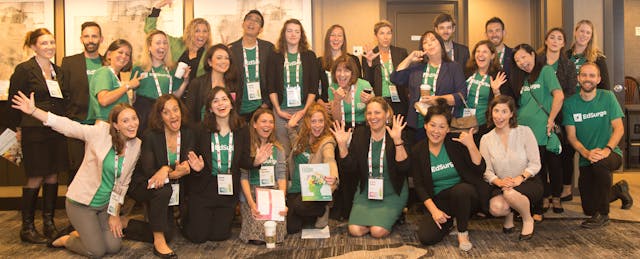EdSurge is redefining its mission.
Eight years ago, we started EdSurge to bridge the emerging communities of edtech developers and users. Using digital technology to deliver curriculum, support professional development and myriad other uses seemed novel; educators who tried them were pioneers.
Now technology has become intertwined with education in countless ways: Few schools lack a student information system and many administrators are becoming savvier about data protection and digital privacy. Teachers routinely share homework and resources electronically and turn to applications that give them a peek at how their students are navigating new concepts rather than waiting for an end-of-semester exam. And at our Fusion conference in October, we were thrilled to hear one education leader after another describe how their communities were changing their practices or rethinking how they wanted to teach because technology had opened up doors.
Even better: Educators, parents and increasingly students around the globe are engaged in rich and complex conversations about what kind of learning environments they want to create or experience. Technologies—from digital curriculum to the latest ideas in artificial intelligence—have given us all a broader collection of tools to support learning, whether that happens in formal settings or any other part of our lives.
So beginning in 2019, the EdSurge team is devoting ourselves to the next leg of the journey, to writing, researching and connecting leaders in education, technology and the communities that support them around the future of learning.
By focusing on the future of learning, we hope to underscore that we all are making choices around how we learn. We’re choosing how we learn and teach; how we build relationships between teachers, mentors, peers and students; when and where we learn; how we support learning throughout our entire lives and countless other issues.
As we chart these paths, choosing the tools—and the technologies—that support us is critical. That means EdSurge will dive even deeper into new technologies and their implications. We’ll chronicle how educators and learners are rethinking practices. And as the old saying goes, with power comes great responsibility. So we will ask tough questions of educators and technologists as we explore the direct and indirect consequences of changing technologies. And we’ll look for stories across the age spectrum—from early childhood education to adult learners.
I’m also pleased to share that we have some great allies to help us. In the fourth quarter of this year, we closed a $2.5 million fundraise. Along with many of our current investors, we received support from Golden Angels, and investors Deborah Quazzo and Jason Palmer. Central to the deal are two new partners for EdSurge, both based in China: JMD.edu, a news, events and research group very much like a cousin to EdSurge, and the Chinese education company TAL Education Group. The founder and CEO of JMD, Sha Mei, will also join the EdSurge board.
Our news stories carry an editor’s note if the story mentions any person or organization that is a direct investor in EdSurge; we believe that kind of disclosure is important. Furthermore, all our investors also signed a statement acknowledging that neither they nor any group affiliated with them will receive special attention from EdSurge.
We also doubled-down on building EdSurge’s reputation as a trusted education media brand. We are deeply honored to share that Raju Narisetti, who now heads the Knight-Bagehot Journalism Fellowship program at the Columbia School of Journalism, is also joining our board. Raju has an extensive background in building respected media organizations, including his time at the Wall Street Journal and Washington Post, his days as a founder of India’s Mint publication and as CEO of Gizmodo Media Group.
Our recent reader survey gave us a fresh look into the topics and the questions that concern you the most. (Thank you for weighing in!) Based on that, we’re planning to focus our writing, research and events around a number of big themes relevant in the US and elsewhere, particularly in China. These will include:
- Developments in teaching and learning, from the science of learning development to personalized learning and whole-child education;
- Trends in technology that supports learning, including emerging technologies such as artificial intelligence along with privacy and data issues;
- Leadership issues in education from broad topics such as managing people to pragmatic issues such as salary gaps;
- The business of education technology, including issues relevant to institutions (such as procurement) and those central to companies, such as business models and financing;
- The future of work from an education perspective, namely what we aim to do to prepare our students (and ourselves) for the world ahead.
We hope you’ll join us both online and at many of the events that we’re planning: We’re excited to share that we’ll host our Immersion workshop for entrepreneurs just ahead of the ASU + GSV Summit in April. We’re ramping up more podcasts and webinars, an exciting fresh Fusion conference, deep research reports and our jobs board.
Even as technology has been woven into the learning we do across all ages, all of us—including learners, educators and technologists—are becoming more sophisticated about what tools we use to help us learn. We’ve seen technology unlock great opportunities—introducing us to people and places and concepts we never dreamed possible. At the same time, it can also become a cauldron for anger and abuse, making it too easy to wedge ourselves into insular and barren corners.
The best way we know to navigate through the excitement and the complexity of what lies ahead is to keep the conversation going. So consider this your open invitation to reach out to us: Send us a note, come by one of our events (either live or online)—but do share with us your hopes and concerns, what you like and, yes, what you don’t.
Thank you for taking this journey with us. We’re all learning, every step of the way.


